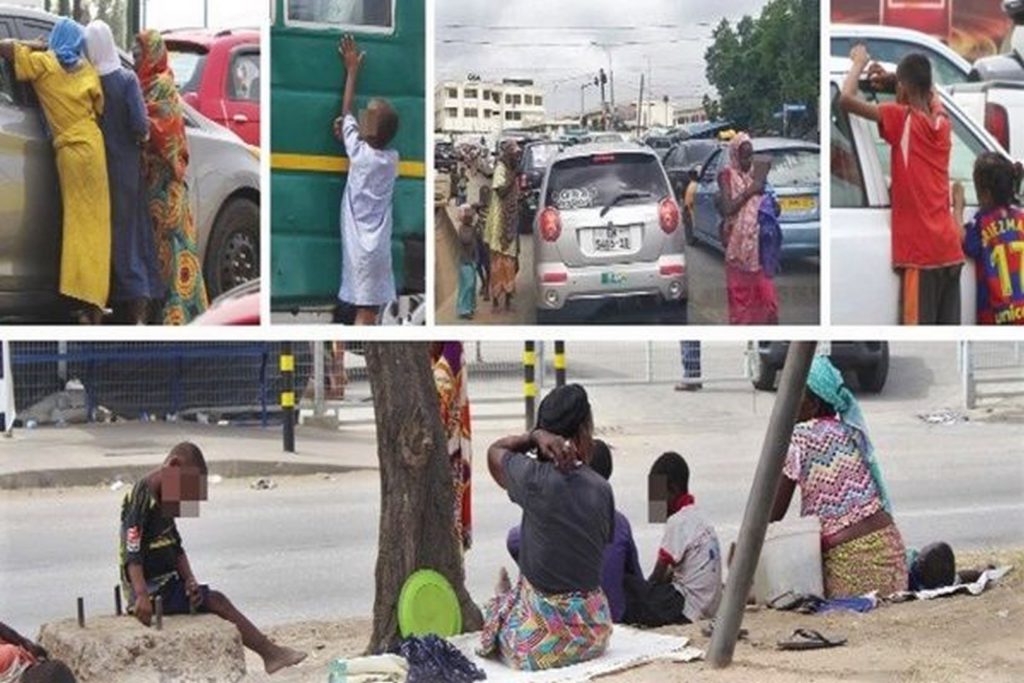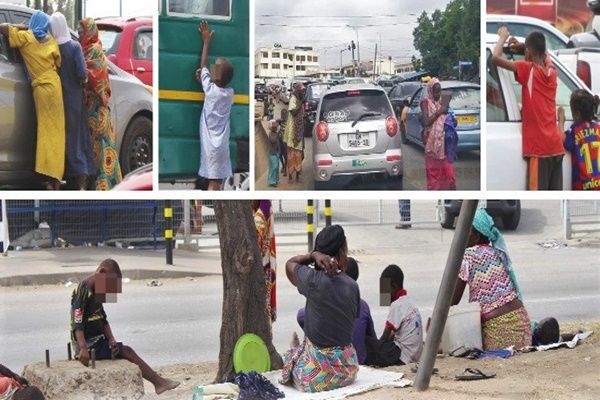We are scared but if we don’t come out, we will starve to death. We couldn’t buy food to save before the lockdown because we don’t have money and a place to put them, Shadrach Adjei told Graphic Online, adding “the street is our home.”
In the Ghanaian context, the term ‘junkies’ does not necessarily refer to drug addicts. Instead, it has assumed a reference also for the homeless youth, mainly young men who live on the streets and earn their living either by carting the goods of people or helping commercial drivers, popularly called ‘Trotros’ to get passengers at bus terminals, bus stops or loading points.
These young men sleep on the pavements during the nights—they are homeless. Others prefer to call them ‘shadow boys.’ The work they do can best be described as ‘hand-to-mouth.’ They earn their daily bread through their daily work.
On the streets of Accra, particularly busy places such as the lorry parks and market centres, these young men are always seen either on the roadsides or inside the markets and lorry parks. They mostly appear unkempt.
Following the coronavirus pandemic, which has extended its frontiers to Ghana, the President of Ghana, Nana Addo Dankwa Akufo-Addo announced a lockdown in Accra, Kumasi, Tema and Kasoa areas of the country on Friday, March 27, 2020 as part of measures to curtail the spread of the disease in the country.
Statistics
Ghana as of April 17, 2020, has 641 confirmed cases with eight deaths, with the disease spreading through 10 out of its 16 administrative regions.
The affected regions are Greater Accra, Ashanti, Northern, Central, Upper East, Upper West, Eastern, North East, Volta and Western Regions.
Lockdown
However, following the lockdown by the president, many of the sources from where these ‘junkies’ get their livelihoods have dried up, leaving them to beg for alms from passersby and commuters on the streets.
On this occasion the Kwame Nkrumah Circle for instance, where these “junkies” are mostly seen assisting commercial vehicles to get passengers, is empty of cars. Only a few commercial vehicles occasionally make a stop to pick the few waiting passengers. The services of the “junkies” are not needed anymore!
Operational areas
But the ‘junkies’ will not go starving—they have found an alternative way of getting their daily bread—they beg for alms. From the Awudome cemetery area through North Industrial Area, Kwame Nkrumah Circle, Dankwah Circle, Abossey Okai, Adabraka, Kaneshie, and Cantonments, the ‘junkies’ together with elderly looking women line up the streets to beg for alms. Some even straddle in the middle of the road to stop speeding cars for alms.
Some of them also stand at places where there are no traffic lights, and under the guise of helping to control traffic flow, they stop one side of the traffic and begin to beg from them.
Sadly, these street beggars do not exercise the social distancing protocols to help contain the coronavirus, as they rush in their numbers towards vehicles. They wear no gloves or masks and use no sanitisers.
Apart from the physical dangers they risk, particularly from getting knocked down by speeding vehicles, these homeless people stand the risk of contracting the coronavirus. This is because they take things from everyone.
In the event that anyone of them gets the virus, they may be spreading the disease among themselves and ultimately, in the areas they find themselves, hence thwarting the national efforts of containing the virus in the country.
Beggars share experiences
Graphic Online on Thursday, April 16, 2020 engaged some of these homeless people on the streets to find out why irrespective of the president’s lockdown directives, they still come out in their numbers to beg for alms on the streets.
Chairman, eno bi easy for us [It’s not easy for us], Shadrach said in pidgin, stressing that “We don’t have food to eat that’s why we come to beg.”
I have not eaten the whole day, he indicated, pulling up his polo shirt to show his flattened tummy.
When asked whether they were not aware of the government’s supply of free meals for homeless people, he said, they have heard about it and that when they visit the areas where the delivery vehicles come to share the food, they are beaten by the police.
The police beat us when we go for the food, he said.
We carry people’s goods to get money and now nobody is travelling so we don’t get anything to carry, Shadrach explained, noting I stay with my younger sibling and I need to get something to feed him but I haven’t even eaten the whole day.
Things are hard for us, he pleaded with the government to come to their aid.
For Akosua Tawiah, an elderly woman who claimed to be a widow and a mother of six, plying her begging business near the Awodome Cemetery area, the police were not giving them their peace of mind.
When we go to where they share the food, the police beat us so we are scared to go to where they share the food because of the police, she shared her experience with Graphic Online, urging those distributing the food not to mass people up before sharing the food.
I have six children and I’m a widow. We need government’s support, Akosua said, noting “They should bring us the raw ingredients instead of the cooked food and they should also add money to it.”
Cynthia, also a homeless person shared a similar sentiment with Graphic Online, saying The police are just beating us and they (police) take the food first before it gets to us and when we go for ours, they come to beat us.
She complained that Those sharing the food don’t do it well, causing congestion and because of that, the police come to beat us.
She wants the government to help the homeless and those on the streets to go back to their various towns since there is nothing for them to do in Accra.
For Ayittey Kwame, also a street beggar, his reason for being on the street was to get his daily bread from benevolent individuals.
If you are hungry, how can I stay home and sleep he quipped, saying I don’t have anything to eat in my house. Nobody knows where I stay so how can they bring me food if I stay home; that is why I have come on the streets.
Adding to the issue, Sylvester said: We are hustlers and there is nothing for us to do. Government must help us to go back to our home.
For Sylvester, We sleep here and do everything here; we have nowhere to go. Things are very hard for us, adding when we come on the streets, the rich people give us either money or food.
For the homeless and the street beggars, in spite of the streets being empty, it still offers them hope of getting their daily bread than just staying at home. They pray that life returns to normal for them to get their daily bread in their usual work of carrying people’s goods or helping commercial drivers to load passengers.
Ghana has no place for the homeless and many of the non-governmental organisations in the country cannot afford to provide shelter and food for this huge numbers of homeless people.
It would appear that the homeless have concluded that although there is a lockdown, each one is for himself and God for us all.
The Ministry for Gender, Children and Social Protection on Tuesday, April 7, 2020, announced the hotlines 0800800800 and 0800900900 for vulnerable individuals and groups in locked-down areas across the country to access free food.
The sector Minister, Mrs Cynthia Morrison said the numbers will guide the Ministry in ensuring equitable distribution of food and called for collaborations with faith-based organisations to help in the distribution of food to some 400,000 Ghanaians.

However, these homeless
people on the streets say they do not have phones to enable them call the
numbers provided by the government for free meals.
They want the distribution teams to rather create
many distribution points so that they don’t get congested at one place, hence
making them prone to contracting the coronavirus disease.

